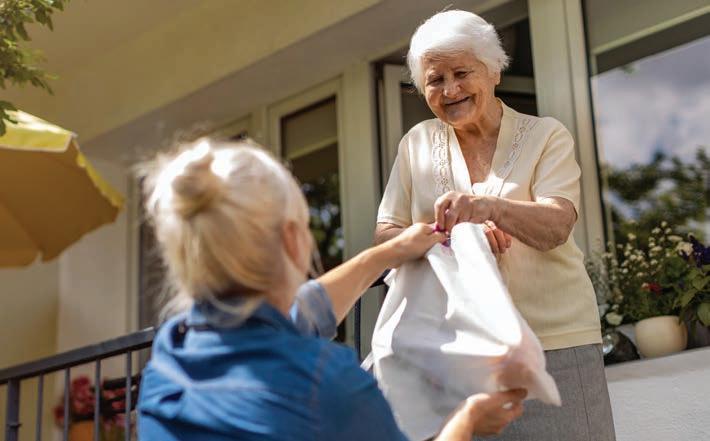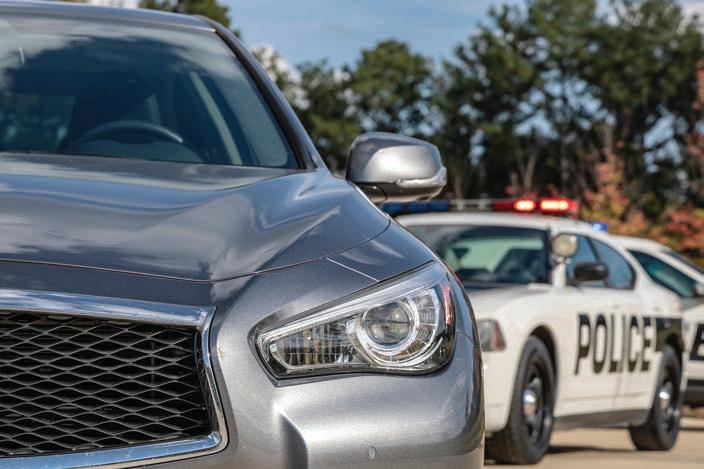
3 minute read
Shoppers for Seniors
Help a neighbor in need–be a shopper for a local senior
The Shoppers for Seniors program began due to COVID-19 but is now a staple in our community. Volunteer to be paired with an older adult who lives close by. Help them with weekly/bi-weekly grocery and/or prescription pickup. This support helps meet their everyday needs and brings them connections that they may not otherwise have without family close by or the ability to get out as much as they’d like.
Learn more and sign up today at arapahoegov.com/volunteer.
from 22,000 in 2019 to 45,000 last year, according to Colorado’s database of reported crimes.
e state has become known for the problem: Colorado led the nation in 2021 with the highest overall vehicle theft rate at 661 thefts per 100,000 people, according to the National Insurance Crime Bureau, a not-for-pro t organization that tracks crime data.

Backed by Gov. Jared Polis, the bill appears to have an easy path to becoming law. But whether it can make a large dent in auto theft rates is another matter. A longtime criminologist doubts the bill can change behavior.
“Whenever we increase penalties, that doesn’t actually produce a deterrent e ect because what actually produces a deterrent e ect is a belief that you’re going to get caught,” said Lisa Pasko, an associate professor and chair at the University of Denver Department of Sociology and Criminology. “We’ve had 100 years of criminology to show that increasing penalties doesn’t produce a general deterrent e ect.”
What bill would change
Today, stealing a car worth less than $2,000 is treated as a misdemeanor in Colorado, while stealing cars worth more is a felony.
“Not only is it unfair, it simply doesn’t make sense,” state Sen. Rachel Zenzinger, an Arvada Democrat, said in a news release. She added: “A stolen car represents much more than stolen property — it impacts people’s ability to get to work, shop for groceries and live their daily lives.”
If state Senate Bill 23-097 passes, the penalties for auto theft would no longer be based on the value of the vehicle stolen. e proposal would make most auto theft a felony regardless of the vehicle’s value.
Some portion of what would be misdemeanors — on the low end of stolen vehicle value — would then be treated as felonies, but Weekly said he had not seen speci cs on what percentage of thefts would be classied di erently.
Arapahoe County Sheri Tyler Brown also did not know. But Brown, another supporter of the bill, highlighted another change he says would strengthen accountability.
“We’re seeing a lot of people in stolen cars saying, ‘Oh, I just borrowed this car from so and so — I didn’t know it was stolen,’” Brown said. If the vehicle is in a situation that would make a “reasonable person” likely to know it was stolen, the bill makes it easier for authorities to charge that person, Brown said.
Pasko argued the bill doesn’t address the “front end” of why people are stealing cars.
A web of influences
Pasko, who wrote a commentary on recent media coverage of the increase in Colorado’s crime rates, pointed to a range of factors that can in uence crime.
“As we have long known, increase in crime is tied with housing insecurity, drug misuse and abuse, gun sales, unemployment and joblessness, mental health struggles, family disruption and violence, as well as fewer youth in school, (and) lower consumer con dence,” Pasko wrote.
Many people are stealing cars to live in them, a problem that could re ect how una ordable the Denver area is to live in, she told Colorado Community Media.
“We see evidence of living in (stolen cars) including drug use. We also see the drug of choice here is meth,” Pasko said.
Sometimes there are habitual offenders, Pasko said, “but they are not the ones accounting for thousands and thousands of car thefts. It’s just not possible.”
Weekly spoke to the pattern of repeat o enders in his jurisdiction in Douglas County.
“ ey’re out on bond very quickly, and they’re going out and committing auto theft again,” Weekly said.

Pasko pointed to other historical periods in the 1970s, `80s and `90s in evaluating crime policies.
“We’ve done this same thing, which is increase penalties, increase jail time and increase incarceration, and it’s never given us the results we want,” Pasko said.
She added: “We need police, jails, and prison, for sure. But we need more front-end services too, to avoid crime in the rst place.”
Mental health needs
Brown, a Democrat, pointed to the need for those kinds of services, noting the lack of “community bedspace” for people going through mental health crisis and the lack of mental health clinicians to help with those situations.
“People that are struggling with mental health don’t have the resources they need, and then there’s certain times — and it’s not all the time — but there are certain times when they’re self-medicating and they’re involved in these activities that can fall into the categories that




